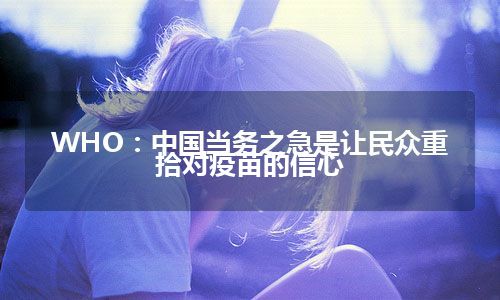Vaccines have a special role in public health – they are given to healthy children, to prevent serious diseases like hepatitis B, diphtheria, pertussis (whooping cough), and bacterial meningitis.

Since the introduction and widespread use of modern vaccines over the last century, hundreds of millions of lives have been saved all over the world.
In many countries, diseases like measles, rubella, and poliomyelitis have been eliminated completely.
Vaccines have become so central to modern public health it would be easy to take them for granted.
But vaccines are complex biologic products, requiring strong regulation and management to ensure that they are manufactured properly, and handled correctly at every step from factory door, to clinic, to child.
Without careful handling, vaccines can lose some of their potency and effectiveness.
Last week's exposure of a criminal ring re-selling vaccines across China has revealed problems in one part of this supply chain – the distribution of vaccines available for purchase on the private market.
The production of vaccines in China is not at issue here. WHO is confident in the manufacturing of all Chinese vaccines, based on over 15 years of working closely with the national vaccine regulators.
WHO conducted in-depth, independent assessment of China's vaccine regulation in 2010 and 2014, finding both times that China's regulatory system meets or exceeds WHO/international standards.
Both the vaccines that are distributed for free to all children through the Government's Expanded Program on Immunisation (EPI), and vaccines available for private purchase, are subject to the same stringent regulations on manufacturing.
Thus, all vaccines in China start life the same way – through a process that WHO has certified will produce safe, pure, and effective vaccines.
The issue is what happens once the vaccines leave the factory. The government-distributed, free (EPI) vaccines are distributed through a tightly managed, cold chain system.
A WHO-UNICEF evaluation of the EPI management system in 2014 and 2015 concluded that capacity to effectively manage vaccines is very strong.
The problem that last week's events have brought to light, is that distribution of vaccines for the private market do not follow the same high standards.
And sadly, this weakness in the system has been exploited by an unscrupulous few intent on making some quick cash, without any apparent regard for the implications for children's health.
China's EPI system is one of the best in the world.
The results speak for themselves: over 99% of Chinese children are now free for life from chronic hepatitis B as a result of use of hepatitis B vaccination. Poliomyelitis was eliminated 16 years ago. The incidence of measles is 99% lower than during the pre-vaccine era.
These accomplishments should inspire confidence.
Vaccines available for private purchase are also important for children's health.
In fact, there are some vaccines currently only available on the private market in China, which WHO recommends be included in the national immunization program – including for pneumonia/meningitis, pneumococcal, and rotavirus.
This would ensure that all children in China would benefit from the use of these vaccines, and have the benefit of bringing them into the more tightly managed government distribution system.
The ongoing investigation by health authorities and the police into China's vaccine reselling ring shows how seriously the Chinese government is taking this incident.
WHO is in close contact with the health authorities as they conduct their investigation, and have offered our full support.
Ultimately, though, this incident has highlighted the need for much stricter enforcement of vaccine management regulations across the board.
Specifically, the same high standards used to distribute EPI vaccines should be used in the distribution of privately-purchased vaccines.
This would ensure that the activities which sparked the current investigation would never be able to happen again.
One of the problems with the current events is the risk that parents' confidence in immunisation will be diminished, and they will decline routine vaccination of their children.
This would be a terrible outcome – because vaccines are the only way to prevent a range of debilitating, deadly childhood diseases.
Improving management, monitoring and oversight of privately purchased vaccines in China is crucial to ensure the safety and effectiveness of all vaccines.
Urgent action to achieve is needed to restore the public's trust and confidence in vaccines in China, and to keep China's children healthy.
The author is World Health Organization representative in China.